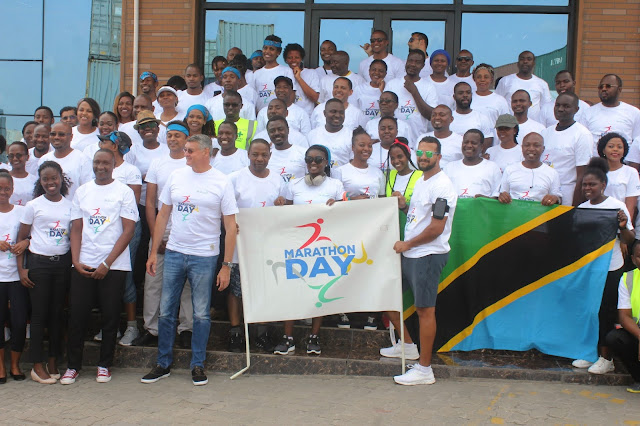Mr. Eugen Mawele (left)—a paralegal from Chemba district (Dodoma) receiving paralegals-re-fresher course certificate from LSF Chief Executive Officer, Lulu Ng’wanakilala, during legal aid stakeholders’ conference held in Dodoma and organized by LSF. (Correspondent).
More than 5 million poor Tanzanians have received legal aid services and helped out of legal and related problems through a national-wide paralegal projects implemented by legal aid organizations with funding from the Legal Services Facility (LSF).
This was revealed in Dodoma recently during a stakeholders meeting of legal aid providers involved in the implementation of LSF-financed paralegal and legal aid projects across the country—mainland and Zanzibar. The meeting which attracted representatives from 200 legal aid organization funded by LSF, sought to provide space for the stakeholders to discuss successes stories registered in the implementation of the project and put in place workable strategies for improvement of legal aid services delivery and assist millions of needy- poor to access justice.
Speaking to reporters on the sidelines of the meeting, LSF Chief Executive Officer, Lulu Ng’wanakilala said “In general, we have made great strides in the implementation of this project...we have reached more than 5 million people with various legal problems since the project incepted in 2011. All these people have received legal aid services through paralegals from legal aid providers funded by LSF in the country.”
So far, LSF has recruited over 3,000 paralegals, who work mainly in rural areas, where the majority of people do not have access to legal aid services and experience various legal and related problems, especially women. Some of the problems facing many people include those related to inheritance, land, child custody, early pregnancy and many others, according to an official statement issued by LSF.
According to the LSF CEO, the meeting, besides other things, focused on enabling legal providers to evaluate the objectives of the project and find out what they have achieved or not and chart out strategies to widen the scope of legal aid services delivery and enable needy-poor Tanzanians to access justice. “Legal aid services has greatly expanded and helped many people to access justice across the country. For instance, last year more than 3 million people were reached and received legal aid services, whereby 76,000 cases were filed and 60 per cent of them were resolved.”
Mr Marius Isavika, Project Manager from KASADEFO (Simiyu Region), one of the organisations implementing LSF-financed project, said his organisation had resolved many land disputes and solved other problems facing people living in rural areas through paralegals in various wards in Simiyu Region.
“We focus more on women and poor people living in the rural areas, taking into account that it is only 7 per cent of Simiyu residents, who live in urban areas. The rest live in rural settings. So, we, KASADEFO, see the LSF project as a big help to poor people (with legal and problems) in Simuyu Region.”
For her part, Ms Veronica Olomi, Communication Officer of KWIECO (Kilimanjaro) said through about its 170 paralegals, the organization assisted many people out of various legal problems, “but we still have a big challenge because paralegals we have serve in fewer wards compared to the number of people in need of legal aid services. This means legal aid services are still inaccessible to many people.”
“However, as an organisation we continue raising public awareness especially in wards without paralegals to enable them to utilise available systems - ward tribunals, local government, social development officers and various organs – so that they may get their rights.”
The meeting focused also on building capacity, addressing various challenges in various parts of the country and set priorities in the implementation of projects to bring about development and get the anticipated results, which are equal rights to all for the development of the people and the country in general, according to Ms Scholastica Jullu, LSF Project Director.
“The meeting provided, among other things, an opportunity to LSF to highlight its strategic plan, which aims at improving legal aid services, including increasing access to legal aid services in urban areas because urban challenges differ from rural challenges and LSF has been implementing its projects especially in rural areas,” reads part of a statement from LSF.














































